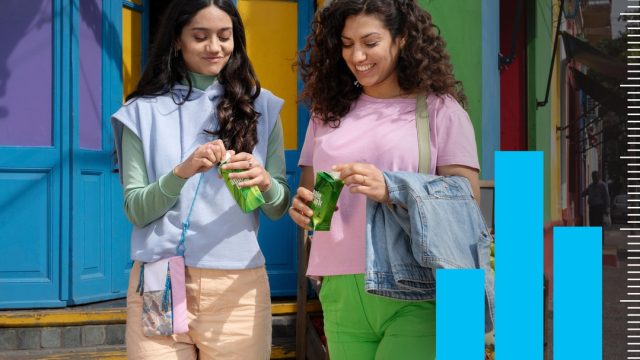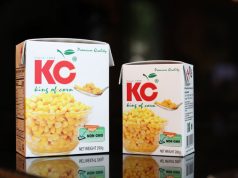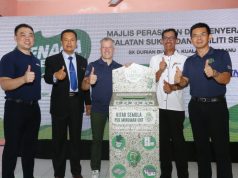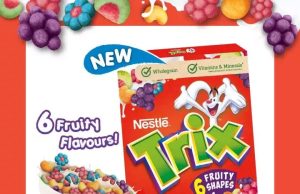- Three of the top five sustainability commitments by businesses involve plastic reduction.
- Satisfying consumers’ demand for sustainability is a primary driving force for tackling environmental issues.
- 77% of businesses are willing to accept the cost of implementing sustainable business practices.
Kuala Lumpur, Malaysia (16 April 2024): Today’s food and beverage (F&B) companies are poised to minimise plastic as a favoured[1] packaging material, as recent research has unveiled that three out of the top five commitments made by business leaders to address sustainability challenges include the reduction of plastic usage.[2] Tetra Pak’s research examined F&B manufacturers’ attitude to sustainability, now and in five years’ time.[3]
Half of the surveyed businesses pinpointed consumer demand as the main catalyst behind implementing new sustainable solutions within the manufacturing and processing arena. This echoes the sentiment found in a separate Tetra Pak consumer study on packaging.[4] It found the intention to buy among almost three out of four respondents (74%) would increase if a brand talked about environmental topics,[5] while 42% believe that an “environmentally sound package” justifies a higher price,[6] providing the industry with a reassuring case for adopting a business model that reduces environmental impact.
77% of businesses expressed a willingness to accept cost-related trade-offs associated with the implementation of sustainable manufacturing and processing solutions,[7] despite the industry facing ongoing macro-economic challenges. This insight follows COP28, which saw many private sector stakeholders committing to sustainability targets and initiatives, including Tetra Pak’s action-oriented approach towards food systems transformation.[8]
Business’ focus on environmental impact is seemingly at a tipping point, with the urgency to adopt practices that decarbonise the world’s food systems predicted to surge by 10% in the next five years, from 49% to 59%. When asked how packaging and processing suppliers can contribute, 65% of companies identified the importance of new product developments, confirming the critical role played by innovation in our global fight against climate change.
Terrynz Tan, Sustainability Director for ASEAN, Tetra Pak notes: “The result from this study confirms the consumer shift we are witnessing when it comes to the environment. They want F&B brands to be transparent, credible, and make a positive impact. Sustainable packaging isn’t just about being eco-friendly — it’s a chance for beverage makers to connect with customers in meaningful ways. By choosing renewable materials, brands can stand out in a crowded market and appeal to those who care about the planet. At Tetra Pak, we’re passionate about creating the most sustainable food package possible. It’s not just about business; it’s about our commitment to responsibly sourced, recyclable, and carbon-neutral packaging.”
Gilles Tisserand, Vice President Climate & Biodiversity, Tetra Pak, comments: “The food and beverage industry is at a critical moment, rethinking its way of doing business to help address the climate emergency and dealing with the inevitable impact this has on their operations and solutions. They are looking to suppliers to help them thrive in an increasingly competitive market, and we remain committed to playing our part, keeping the innovation engine running to develop new research, collaborative ecosystems and product offering.”
He continues: “Our innovation pathway is driven by renewability and recyclability, ensuring the decarbonisation and circularity of materials and addressing the need for sustainable food packaging. Findings such as the fact that cartons are considered by consumers to be the most ‘environmentally sound’ beverage package, while plastic is considered the least,[9] are a testament that we are on the right path. You only need to look at the fact that we sold 46% more packages made with plant-based polymers in 2023 compared to 2021[10] to see that the industry is committed to change.”
[1] According to the UN, 36 per cent of all plastics produced are used in packaging, source https://www.unep.org/interactives/beat-plastic-pollution/#:~:text=Approximately%2036%20per%20cent%20of,landfills%20or%20as%20unregulated%20waste
[2] The top five commitments were reducing dependency on plastic; reduction of plastic packaging demand in food delivery; reduction of food waste in F&B plant; reduction of plastic packaging waste in F&B value chain; logistics improvement across value chain.
[3] Tetra Pak’s business-to-business research on Planetary Challenges and their impact on F&B manufacturers’ operations has been run in 2023, based on a combined methodology – quantitative research panel and qualitative component (expert interviews). Qualitative research included approx. 20 interviews conducted with Tetra Pak’s internal experts plus 12 with the F&B manufacturers, distributed across all regions that are within the scope of the project. Quantitative research comprised 346 interviews across 19 markets (Italy, Poland, Spain, France, Germany, UK, Australia, India, South Africa, Mexico, Argentina, Brazil, China, Vietnam, USA, South Korea, South Arabia, Turkey, Japan).
[4] Tetra Pak’s latest Sustainable Packaging consumer research, run in 2023, comprised a total of 14,500 consumer interviews based on an online questionnaire in 29 markets: Germany, France, UK, Italy, Belgium, Denmark, Netherlands, Poland, Portugal, Romania, Spain, Sweden, Saudi Arabia, Turkey, South Africa, Egypt, China, India, Japan, Australia, Indonesia, Philippines, South Korea, Vietnam, Brazil, USA, Mexico, Colombia, Argentina
[5] To the question “If a brand communicates/talks about environmental topics, your intention to buy the brand would…” 74% responded it would increase. Base TOTAL 2023: 14539.
[6] To the question “Which of the following sentences better fits with your thought about an environmentally sound packaging?” 42% responded that a product in an environmentally sound packaging is worth a higher price than a product in a standard packaging.
[7] To the question “Please evaluate the willingness of your company to accept various trade-offs while implementing sustainable solutions within manufacturing/processing area” 41% responded they will definitely accept cost-related trade-offs, 36% will probably accept cost-related trade-offs, 10% neither won’t nor will accept, 11% probably won’t accept, 3% definitely won’t accept.
[8] https://www.tetrapak.com/about-tetra-pak/news-and-events/newsarchive/tetra-pak-unveils-action-oriented-approach-towards-food-systems-transformation
[9] To the question “Which one of the following types of packaging for beverage do you believe is the most environmentally sound?” 41% respondents chose carton package, 37% glass bottle, 8% plastic bottle 8% metal can, 3% plastic cup, 3% plastic pouch. To the question “Which one of the following types of packaging for beverage do you believe is the least environmentally sound?” 32% said plastic bottle, 23% plastic pouch, 17% plastic cup, 13% metal can, 9% glass bottle, 6% carton package.
[10] Tetra Pak sold 7.1 billion packages with plant-based polymers in 2021, 8.8 billion packages with plant-based polymers in 2022 and 10.4 billion packages with plant-based polymers in 2023. Volumes exclude Blend in BIO (BiB) sold in Brazil. BiB is a mix of 75% LDPE and 25% plant-based LDPE.













